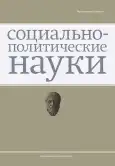Анализ формирования подсистемы международных отношений в Северо-Восточной Азии с точки зрения цивилизационного подхода. Часть 1
- Авторы: Никифоров С.В.1
-
Учреждения:
- Московский международный университет
- Выпуск: Том 12, № 4 (2022)
- Страницы: 162-168
- Раздел: Статьи
- URL: https://journal-vniispk.ru/2223-0092/article/view/147000
- DOI: https://doi.org/10.33693/2223-0092-2022-12-4-162-168
- ID: 147000
Цитировать
Аннотация
Цель и задачи написания статьи. Цель статьи - анализ формирования подсистемы международных отношений в Северо-Восточной Азии с точки зрения цивилизационного подхода. Решаются следующие задачи: исследование конфигурации действующих сил суперэтнического уровня и активности неэтнических систем подсистемы международных отношений в Северо-Восточной Азии и составление периодизации моделей международных отношений на срезе этносферы в данном регионе. Методологический подход. Основной в работе является методология Л.Н. Гумилёва, а также системный подход, развиваемых в востоковедческой политологии А.Д. Воскресенским, также применяются общенаучные методы познания и сравнительно-исторический метод. Результаты и выводы. В статье предлагается авторская периодизация моделей международных отношений на срезе этносферы в Северо-Восточной Азии с точки зрения цивилизационного подхода. Оригинальность и ценность работы. Исследование представляет ценность в виду своей актуальности и оригинальности работы, делающей акцент на получении новых знаний о конфигурации действующих сил суперэтнического уровня и активности неэтнических систем подсистемы международных отношений в Северо-Восточной Азии и о периодизации моделей международных отношений на срезе этносферы в данном регионе.
Полный текст
Открыть статью на сайте журналаОб авторах
Святослав Вадимович Никифоров
Московский международный университет
Email: ursus-arktos@yandex.ru
старший преподаватель кафедры истории, теории государства и права и международного права М Москва, Российская Федерация
Список литературы
- Абаев Н.В. Влияние тэнгрианской идеологии на социальную организацию и государственность в империях хунну и монголов: некоторые методологические аспекты // Вестник Бурятского государственного университета. 2013. № 6. С. 134-141.
- Базаров Б.В. Военно-административная организация Монгольской империи // Власть. 2015. № 02. С. 168-172.
- Бичурин Н.Я. (Иакинф). Собрание сведений о народах, обитавших в Средней Азии в древние времена. М.; Л.: Изд-во АН СССР, Институт этнографии им. Миклухо-Маклая, 1950. Т. 1. 471 с.; Т. 2. 335 с.
- Васильев Л.С. История религий Востока. Конфуцианство и легизм [Электронный ресурс]. 2000. URL: https://abhidharma.ru/A/Raznoe/0043.pdf
- Гумилев Л.Н. Древние тюрки. Гл. XIII: Рождение империи Тан [Электронный ресурс]. 1999. URL: http://www.gumilevica.kulichki.net/OT/ot13.htm
- Гумилев Л.Н. Древние тюрки. Гл. XXIV: Голубые тюрки о себе [Электронный ресурс]. 1999. URL: http://www.gumilevica.kulichki.net/OT/ot24.htm
- Дюмулен Г. История дзэн-буддизма / пер. с англ. Ю.В. Бондарева [Электронный ресурс]. 2003. URL: http://abhidharma.ru/A/Simvol/Dzen/History%20Dzen.pdf
- Карамазов В.Д. Религиозный синкретизм в Китае [Электронный ресурс]. 2014. URL: https://history.wikireading.ru/409163
- Козинец А.И. Конфуцианский порядок в Восточной Азии: значение для теории международных отношений // Ойкумена. 2016. № 2. С. 106-122.
- Липовцева Е.М. Модификация значений самоназваний Китая - от доконфуцианской философии к учению Конфуция // Вестник Томского государственного университета. 2007. № 303. С. 25-28.
- Меликсетов А.В. История Китая. Китай под властью монгольской империи [Электронный ресурс]. 2002. URL: https://history.wikireading.ru/96292
- Михалевич С.С. Ранний этап деятельности вокоу в Китае и Корее // Достижения науки и образования. 2018. № 7 (29). Т. 1. С. 29-31.
- Неженец Н.И., Неженец А.Н., Реуцкая Е.М. Русь соборная в образном слове, или Искусство художественности: монография. М.: Раритет, 2011. С. 245-246.
- Ососков Г.В. Официальная идеология Российской империи XIX века «православие-самодержавие-народность» (социально-философский анализ) // Россия: тенденции и перспективы развития. Ежегодник ИНИОН РАН. 2017. С. 659-662.
- Тенгрианство - религия тюрков. Современное евразийство // Центр Льва Гумилева в Кыргызстане [Электронный ресурс]. 2013. URL: http://su.gumilev-center.ru/tengrianstvo-religiya-tyurkov/
- Халтаева О.Р. Концепция государственного управления легистов и учение о небе в период Чуньцю и Чжаньго // Вестник Бурятского государственного университета. 2015. Вып. 14. С. 9-13.
- Цзоу Хун. Влияние конфуцианской идеи ритуала «Ли» на идеологию и культуру народов Кореи и Японии // Гуманитарный вектор. 2009. № 4. С. 92-97.
- Шагдар Бира. Монгольская идеология тенгризма и Хубилай-хан // Золотоордынское обозрение. 2013. № 1. С. 36-44.
Дополнительные файлы








